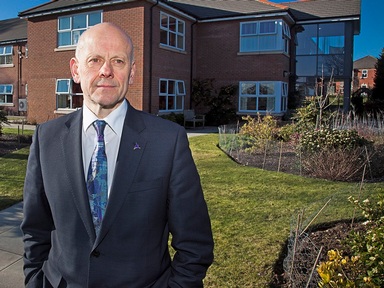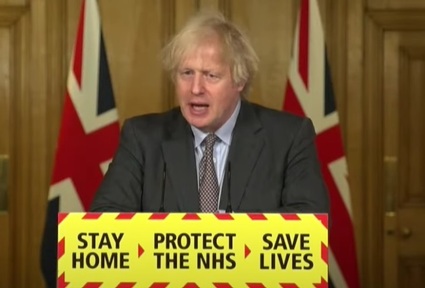Care homes should refuse to employ staff who do not get vaccine, says care leader
Care homes should be allowed to refuse to hire staff who have not had a COVID-19 jab, unless they have a legitimate medical reason, says a care leader, while Professor Chris Whitty says it is care workers' "professional responsibility" to have the jab.

Mario Kreft, chair of Care Forum Wales, which represents nearly 500 independent care providers in Wales, believes ‘care homes are duty bound’ to do everything in their power to protect their residents and staff.
There have been 1,709 care home resident deaths in Wales with COVID-19 since 1 March last year and it is estimated around a fifth (20 per cent) of care home staff in Wales have not had the jab.
Mario Kreft said: “It only takes one person to bring one of the new strains of the virus into vulnerable people.
“It is clearly sensible that care homes should be allowed to refuse to recruit anybody who has not been vaccinated.
“It is clear that, quite understandably, the families of residents will want assurances that the staff looking after their loved ones are vaccinated.”
“I think everybody who works in social care should, unless there's a very good reason otherwise, get the jab and importantly be ready for a culture where we might have to have this each year for some years to come".
Care Forum Wales council member Sanjiv Joshi echoed Mr Kreft’s view. Sanjiv Joshi said: “If you’re working in a care home, your mission is to care and protect your residents – that’s your solemn promise. The science is very clear that the vaccine reduces serious symptoms and the number of deaths.
“Unless you have a legitimate reason like a medical issue or a religious objection, you should be rushing to be vaccinated.”
Downing Street: Care staff taking vaccine is a 'professional responsibility'

Health secretary Matt Hancock confirmed last week that one third of England's social care staff had not had the vaccine, despite being in the top two priority groups, who have been able to access the vaccine since December.
Downing Street has said that a ‘no jab, no job’ policy was ‘discriminatory’ and that vaccines should not be mandatory.
The Prime minister Boris Johnson has indicated that the government does not plan to make the vaccine mandatory. Boris Johnson is instead urging those who are eligible to receive the vaccine to have it.
In a Downing street briefing about England's road map to lifting COVID-19 restrictions on 22 February, Mr Johnson was asked by a journalist if taking the vaccine should be a condition of employment.
Mr Johnson said: "I suppose I ought not to dodge that implication and just say that I think that in the case of care homes, I know that some of the very high quality care home groups are now looking at what they can do to make sure that their staff are indeed vaccinated."
England's chief medical officer Professor Chris Whitty said: "In most health and social care settings I have seen, people are really keen to get the vaccine".
Professor Whitty went on to say that in his view "it is a professional responsibility" for health and social care workers to have the vaccine.
Trade unions want 'persuasion not compulsion'
The Trades Unions Congress (TUC) has said that ‘getting vaccinated must not be made a condition of employment or access to public services’ and that staff should be given paid time-off to get vaccinated.
It stated: ‘Compliance with the vaccination programme should be achieved through persuasion not compulsion’.
Christina McAnea, general secretary of the trade union, Unison, said care workers vaccinated should be achieved through "encouragement and persuasion".
Ms McAnea said care workers must be provided with "time to ask the experts about their concerns”. She also said “care employers who put punitive measures in place for staff, or make it a condition of work, are undermining trust and confidence in the vaccine”.
Care minister Helen Whately has admitted that she is aware of some care bosses making vaccination mandatory for new staff. Ms Whately told BBC Radio 4’s Today programme that the government is focused on creating opportunities for care staff to get vaccinated.
Helen Whately said: “What we’re doing at the moment is making sure that health and social care workers have every opportunity to have the vaccination.
“So for care home workers, making sure that teams go into care homes not just once but multiple times, going in at least four times in order to offer the vaccine, for instance, to shift workers who may not have been there when the team went in, those who have been COVID positive and couldn’t have the vaccine first time round.”
Latest News
 29-Jul-24
Dementia Bus gives carehome.co.uk staff insight into life with dementia
29-Jul-24
Dementia Bus gives carehome.co.uk staff insight into life with dementia
 01-Mar-24
Find out the top care homes in 2024
01-Mar-24
Find out the top care homes in 2024
 21-Mar-23
UK's top care homes in 2023 revealed
21-Mar-23
UK's top care homes in 2023 revealed
 03-Jan-23
carehome.co.uk launches free care helpline
03-Jan-23
carehome.co.uk launches free care helpline
 13-Dec-22
5 mins with Emily Whitehurst, chief operating officer for Constantia Healthcare
13-Dec-22
5 mins with Emily Whitehurst, chief operating officer for Constantia Healthcare